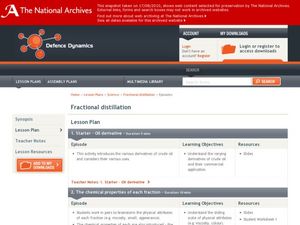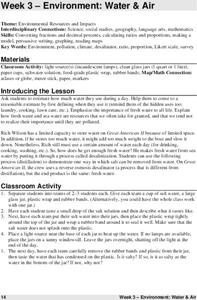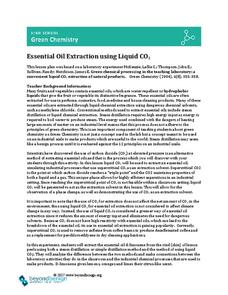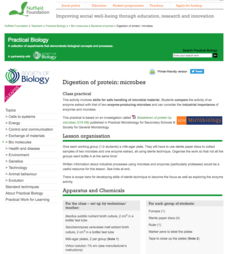Curated OER
Recognition and Classification of Mixtures
Immerse your chemistry class in solutions! They melt and compare the mixtures that make up margarine, separate black ink into its component colors, distill ocean saltwater, and practice chromatography with plant pigments. There are eight...
Curated OER
Fractional Distillation
Students brainstorm the different uses of petroleum distillates. In this chemistry lesson, students explain the process of fractional distillation. They analyze the impact of oil extraction to the environment.
Curated OER
Coal Derivatives by Destructive Distillation
Chemists use the destructive distillation technique to produce three derivatives from a sample of bituminous coal. You will find background information, a materials list, procedures, and sample follow-up questions that you can use in...
Foundation for Water & Energy Education
What is the Water Cycle? Activity B
Curious physical scientists follow a lesson on the properties of water with this lesson on distillation. They observe a miniature water cycle model that filters dirty water into clean water. These two lessons combined are an enriching...
Curated OER
Environment: Water & Air
The introduction to the lesson mentions a sailor's limited capacity to store drinking water on his ship. Pupils then set up an overnight experiment to remove freshwater from salt water by distillation. There is a math and map activity to...
Curated OER
The Chemistry of Refining Crude Oil
Consider our energy sources: wood, coal, oil, uranium. Learners compare the pollution to energy produced for each. They practice fractional distillation of an alcohol/water mixture to simulate the process of refining crude oil....
Beyond Benign
Essential Oil Extraction Using Liquid CO2
When life hands you lemons ... experiment on them! Green chemistry gurus compare extraction methods for essential oils through a lab activity. Lab groups use traditional distillation and liquid carbon dioxide extraction methods, then...
Curated OER
Survival Still
Lead your class to construct a solar still on campus to demonstrate how water can be extracted from the soil. The power of solar energy is emphasized, as is the concept of how capillary water can be recovered and purified by using a...
Curated OER
What's In Crude Oil?
Students research the process of fractional distillation. In this chemistry lesson, students perform simple distillation of two liquids. They collect data and share results in class.
Curated OER
The Water Cycle
Observe the stages of the water cycle by completing 3 activities. To help understanding of the water cycle your students can observe evaporation, the formation of frost, vapor and water and the process of distillation which is used to...
Curated OER
Towers of the Lost City
Middle school marine scientists compare the pH change in distilled and saltwater as acetic acid is added one drop at a time. Then they compare the pH change in both when sodium hydroxide is added. This experiment demonstrates the...
Nuffield Foundation
Observing Osmosis, Plasmolysis, and Turgor in Plant Cells
Create the perfect conditions for osmosis. Young scholars use a microscope to observe plant cells exposed to distilled water or sodium chloride. They observe how osmosis creates turgid or plasmolyzed cells.
Nuffield Foundation
Digestion of Protein: Microbes
Milk the resource for all it's worth. Young biologists perform assay techniques to test the digestion of protein. They place bacterial samples, fungal samples, trypsin solution, and distilled water on a milk-agar plate to see the effects...
Curated OER
What's In Crude Oil?
Students investigate crude oil. For this crude oil lesson, students investigate fractional distillation and use this technique to separate two liquids.
Coastal Carolina University
Osmosis and Diffusion Lab: Honey I Blew Up the Bear
Beginning biologists explore passive transport through two demonstrations and a hands-on inquiry. Spray air freshener from one spot in the classroom and have class members raise their hands as the scent reaches them. Also, place a teabag...
American Chemical Society
Changing State: Condensation
When you have a cold drink and you notice the water forming on the outside, it is literally pulling the water from the surrounding air to form the condensation. After watching a demonstration of condensation forming on a glass,...
Curated OER
Explore: 5th Grade Dissolved Oxygen
Fifth graders, in groups, use basic science process skills to measure and compare the dissolved oxygen levels and pH levels of distilled, stream, and pond water.
Curated OER
The Energy Debate - Stoichiometry
Students determine crude oil can be separated into useful fractions by a process of fractional distillation. They write a balanced equation for the reaction between a hydrocarbon and oxygen.
Curated OER
Soil pH Effect on Germination of Specific Weeds
Learners collect weed seeds from three varieties of weeds (knapweed, thistle, or toadflax, for example they may choose others in addition to the spotted knapweed.) They sterilize soil for thirty containers, plant seeds in sterile soil,...
American Chemical Society
Carbon Dioxide Can Make a Solution Acidic
Can your breath change the acidity in a liquid? A lesson begins with a demonstration that proves it can. Then scholars perform an experiment to determine if other gases can change the pH of liquids. Finally, they research how this...
Curated OER
Algae--Where does it Live?
Students discover algae. In this science lesson plan, students examine what green algae is and where it grows. Students test the growth of algae in four different types of water: lake water, well water, distilled water and tap water
Curated OER
A Funny Taste
Students participate in a demonstration that illustrates the relative amounts of salt in various bodies of water including the Dead Sea, Sallt Lake, Ocean water and distilled water. They taste and compare various mixtures.
Curated OER
Rain that Ruins
Students participate in a series of experiments to determine how acid rain contributes to the deterioration of buildings and monuments. Using common building materials, students compare the noticeable short-term affects of distilled...
Curated OER
Investigative Case - Living in an Alkaline Environment
Students are shown many ways in which Mono Lake water and distilled water are different. They demonstrate that the survival of common soil bacteria declines as pH increases. Students examine the behaviors, adaptations, energy transfer,...
Other popular searches
- Fractional Distillation
- Water Distillation
- Distillation Lab
- Simple Distillation
- Distillation Crude Oil
- Fraction Distillation
- Salt Water Distillation
- Distillation Experiments
- Water Cycle and Distillation
- Fractional Distillation Labs
- Science Distillation
- Petroleum Distillation

























